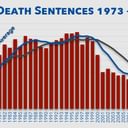By Andrew Cohn
CBSNews.com Legal Analyst
Just three days after the Supreme Court heard a death penalty case and scheduled another one for next term, and just one week after a landmark commission in Illinois released its ominous findings on how the penalty is meted out, a federal judge in New York threatened to declare the federal death penalty unconstitutional in general.
Are these isolated and coincidental actions by unconnected jurists? Or is the tide slowing and surely turning against the death penalty in this country?
The answer is neither and both. There is no legal connection between what U.S. District Judge Jed. S. Rakoff did Thursday in a case involving two New York men charged with conspiracy and racketeering in a drug killing case and the issues the justices are looking at this term or next. Those Supreme Court cases don’t involve the death penalty under federal law. They involve, in Ring v.Arizona, the extent to which judges instead of juries may consider aggravating factors in a capital case, and, in Abdur’Rahman v. Tennessee, whether the defendant was improperly denied certain appellate reviews which might have caught certain critical mistakes made by his attorney.
Likewise there is no direct link between the looming Supreme Court decision on the constitutionality of executing retarded people and the recommendations of the Illinois Commission on Capital Punishment, which in excruciating detail concluded that there are major problems with death penalty procedures in Illinois and by extension any other state that permits capital punishment. I’m sure the justices and their clerks paid attention to the Illinois study but so far its conclusions haven’t seeped into the court’s official parlance.
By the same token, however, there is no getting around the fact that skepticism about the accuracy of death verdicts is growing within the law. It’s a skepticism that has reached as high in the law as Justice Sandra Day O’Connor, who told the Minnesota Women Lawyers last summer that she was concerned by the number of innocent people sentenced to death by a system which clearly isn’t accurate enough to generate the correct result each and every time. O’Connor also reportedly expressed concern about the disparate quality of court-appointed counsel in death cases. She is a key vote on the court and if her extraordinarily candid concerns turn into concrete votes, the court may begin to limit the scope of the death penalty just as surely as it has extended it over the past quarter of a century.
And it is a skepticism which has extended down into the trenches of the judiciary ? federal trial court judges ? one of whom, Rakoff, wrote Thursday that he would void the death penalty under federal law unless the government can convince him otherwise in the next month or so. Rakoff came to his conclusion by turning on its head the Supreme Court’s own assumptions about the federal death penalty. The court had presumed that with certain death penalty safeguards in place it would be “highly unlikely that an executed person would subsequently be discovered to be innocent.”
“That assumption no longer seems tenable,” Rakoff wrote. “Despite the important goals and undoubted popularity of this federal act and similar state statutes, legislatures and courts have always been queasy about the possibility that an innocent person, mistakenly convicted and sentenced to death under such a statute, might be executed before he could vindicate his innocence.” His proof? A Columbia Law School study that indicates there is a whopping “prejudicial error” rate in the death penalty system of 68 percent. Rakoff also could have cited the Illinois study, and perhaps will if the government is unable to convince him otherwise by the end of May.
I don’t know whether or to what extent the death penalty in America is in trouble, but I know that this is how constitutional change occurs in this country. The facts push the law. And now opponents of the death penalty have some undeniable facts on their side. They have studies. They have scholars. They have, in effect, a defendable factual base upon which to rely in challenging the legal status quo. That’s what voided the death penalty in the early 1970s and it’s what brought it back a few years later. It’s also what could void it again. “Stubborn facts,” as they say, can’t be ignored, even by Supreme Court Justices.
Rakoff’s ruling, if he finalizes it, won’t by itself reach beyond the case before him. But if the 2nd U.S. Circuit Court of Appeals upholds his ruling upon appeal, the federal death penalty will be void in New York, Connecticut and Vermont. And if another federal appeals court views the 2nd Circuit’s ruling with approval, perhaps federal prosecutors in a few other states won’t be able to rely upon a federal death penalty. Even another federal trial judge would be able to look upon Rakoff’s ruling for support should that other judge be so inclined to strike down capital punishment. Of course, if the Supreme Court sides with him, the federal death penalty itself could be on the rocks. And if the federal death penalty goes out the window, state death penalty statutes will be in big trouble, too.
That’s a parade of horribles that death penalty proponents probably don’t want to imagine. And they certainly may never have to imagine it. In order for Rakoff’s ruling to represent the cutting edge of this monumental change, literally dozens and dozens of other judges around the country would have to buy into his view that the death penalty system is so broken that it cannot be fixed. That may be a stretch, especially since there are plenty of judges around the country who have absolutely no problem whatsoever with the imposition of the death penalty. Then there’s the Constitution itself, which doesn’t seem to require perfect justice or perfectly accurate procedures even when a defendant’s life is on the line. You can bet that’ll be in the government’s brief to be filed with Rakoff soon.
So legally speaking, something is definitely “up” with the death penalty these days. The Supreme Court appears particularly interested in tinkering with it. More and more law schools and outside scholars are researching its effects. And now those on the front line of the system are challenging it. It may survive, strengthened, or it may fall, but it won’t likely stay the same for very long.



